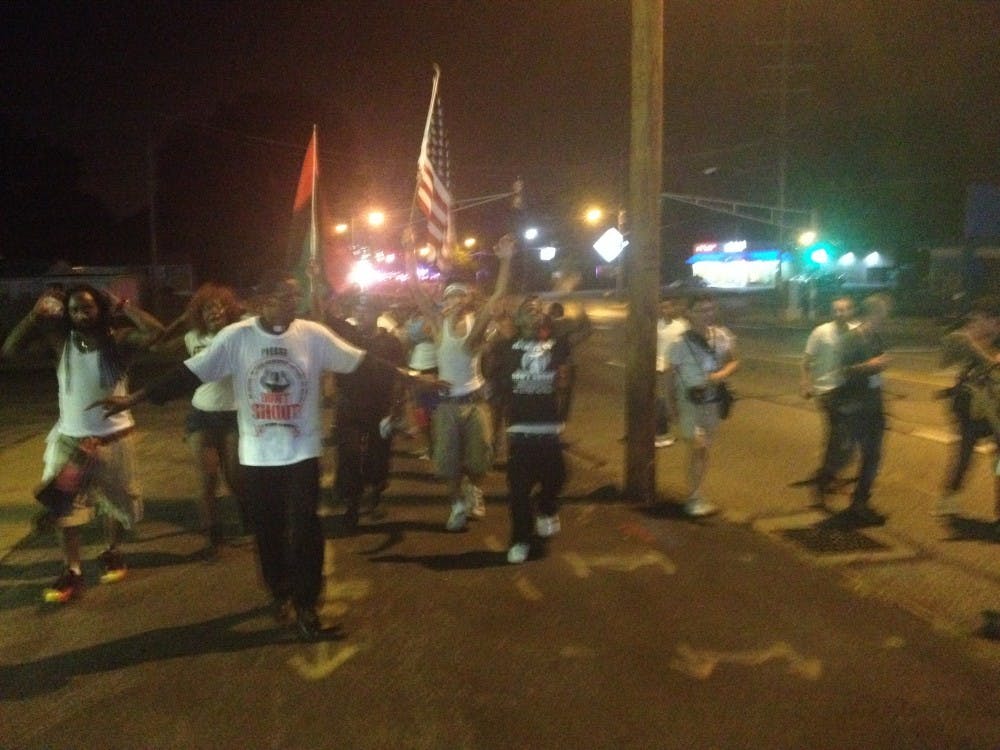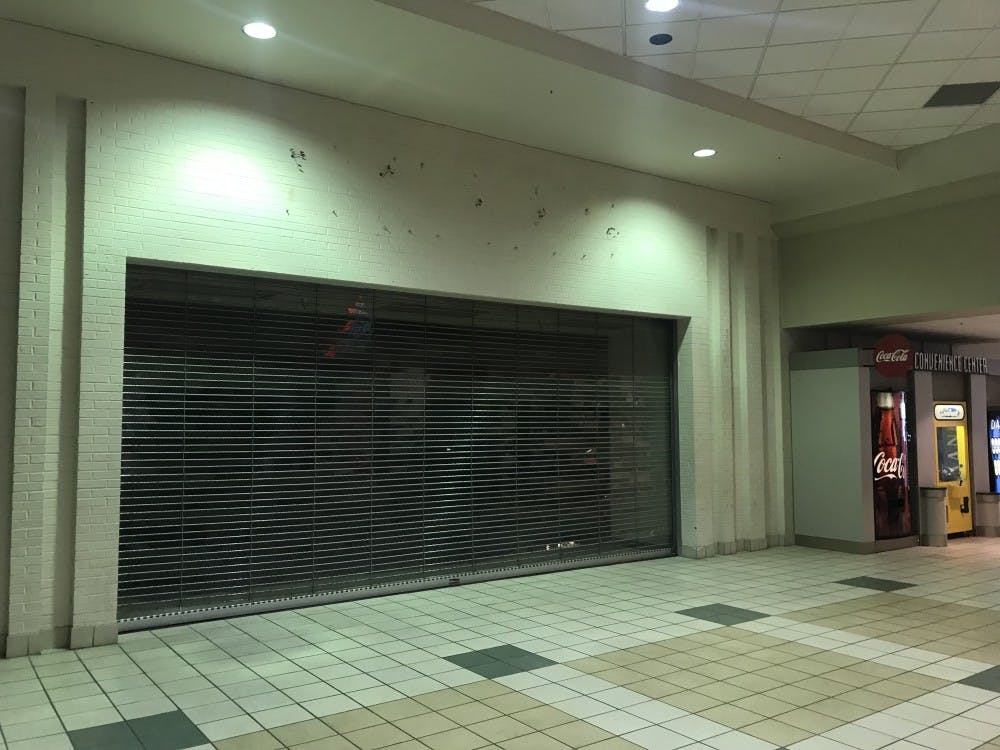Senior video production majors Alex Gracie and Wesley Lorenz spoke with the Daily News on their way home from Ferguson, Missouri on Monday.
Tell us about your experience down in Ferguson, both individually and collectively.
Gracie- When we got there we were pretty scared. When we were going in, we didn’t know what to expect. When we got there, it was jovial. It was definitely a hyped atmosphere. People were protesting peacefully. People were very friendly, they were receptive to us, and it was just completely not what we expected.
Lorenz- There was barbeque going on. It looked like a local food truck owner had come out, we didn’t get the chance to talk to too many of them, but it looked like they had just come out to cook for the community, cook for the protestors, for anybody whose local grocery store was shut down due to the riots that had happened earlier in the week. It was a beautiful, giving community, which from watching the news we had seen, we absolutely did not expect.
What were each of you surprised by most from the whole experience?
Lorenz- Me personally, I guess the thing that I was most surprised by was how different the community was as a whole. We did see several storefronts that were missing windows, that had plywood up, with spray painted words of “Open” or they would say “Rest in peace Mike Brown” so that the civilians would know, most of the owners in the area were black business owners. They didn’t want the violence to be taken out on them, but we saw a lot of buildings with the plywood up and they were all still open.
I think what was so surprising was just how different it was — the first night that we were there, that when we were with the protesters and the huge marches all the way to the police station, which I think was two to three miles from there, it was a huge protest. After that, we didn’t really run into the mainstream media until today.
They all kind of went back to their hometown, honestly there were no more stories that people wanted to hear. Everybody at home wants to hear the violence, the riots the looting. What was really happening was artwork and poets were coming out and expressing their views and churches were giving food to those in need. So to me personally, that was surprising ... how much good was falling through the cracks of news sources. What I thought what got me was this was a nice community.
I wouldn’t say it was like pictures of Indianapolis, but it wasn’t the projects, it wasn’t the ghetto that a lot of us were expecting. We talked to a guy named Alberto, who was a Ball State graduate working in news. He said the same thing. This is not the ghetto, not the projects.
Gracie- To piggy back on Wes, I think another thing to be noted on what is surprising is how incredibly warm, open and friendly the civilians of Ferguson are. I don’t think I’ve ever had more people wish me good morning in my life. Everyone wishes you good morning, whenever someone is driving, you always get waved on, and its like, its this weird southern hospitality. I don’t know if that’s different because I’ve never been to St. Louis before this. Even in the heartache, the riots, the looting, these were some of the nicest people we’ve ever met.
Did you tell the locals what your project was about?
Gracie- Actually a lot of the locals came up to us as soon as they saw the camera, the audio, and all that , they said ‘Oh, where are you guys from? What are you shooting and what are you here for? As soon as we told them that we were all the way out from Indiana to talk about what the press wasn’t talking about, you could see their eyes light up and instantly people would just open to us and tell us people aren’t telling the whole story about Ferguson. We had interview after interview after interview of the people of Ferguson and the surrounding areas that wanted their voices heard, but the mainstream media wouldn’t talk.
We have so much footage of CNN and Fox interviewing white people who live in Ferguson and ignoring the 75 percent of black people who do live there. They’re cherry-picking the stories of what the audiences at home want to see and we just really want the rest of the story up.
Seeing all of that, how does this affect your perception of media?
Gracie- When we were in the car talking to each other, we said if this is what our major news media’s take in Ferguson, I couldn’t imagine what Afghanistan and Iraq really look like. So we kind of question the bigger issue of how different are these places that we’ve never been to? It really makes me, personally, more skeptical of our 24-hour news networks.
By the time the violence had subsided, the only other folks with cameras we saw were independent. But of course they were back today for the funeral because there were a lot of A-list celebrities. The press lined up today and did exactly what we wanted them to do. We wanted to see how they handled a funeral and how they handled a grieving family, and cameras were stuck in faces and people were pushing each other for different shots. We left early because we didn’t feel that we were supposed to be there. I mean, we did cover our story, you know, we shot the press doing these things, but we really just didn’t feel like it was our place. We agreed in the morning no interviews today.
Has your angle for the documentary changed since the beginning of the trip?
Lorenz- When we went in there last week we saw how the media was a problem because they were outnumbering the protesters and they were getting in the way and weren’t helping at all. When we got there, they weren’t helping the issue in a different way: they weren’t covering all of the positives that we saw. So that’s how our documentary was built and is still about the media, but more about what they aren’t doing as opposed to what they are doing.
Gracie- We personally witnessed a police officer coming up to a press agent and saying “Everyone on the sidewalk,” and this guy tries flashing him his press pass and the police officer says, “I don’t care who you are, get on the sidewalk.” And then we hear this guy joking with his buddies saying “This guy is going to be a problem this weekend.” So it’s the press that has this mind set that they’re above the regulations of the protestors and so that was part of the original plan, but we saw in the next few days we saw that they weren’t telling stories about the healing.
What are you hoping to accomplish from the documentary?
Gracie- Really with a good film, every audience member can walk out with something different. If I had to narrow it down with one thing, I want people to be inspired to do their own research and to not necessarily turn away from mainstream media but to question when things don’t feel right, when things don’t seem like what they are and to get all of the story.





